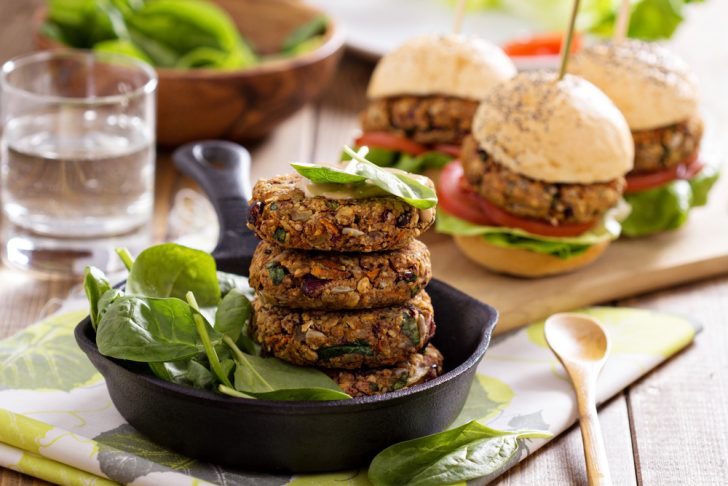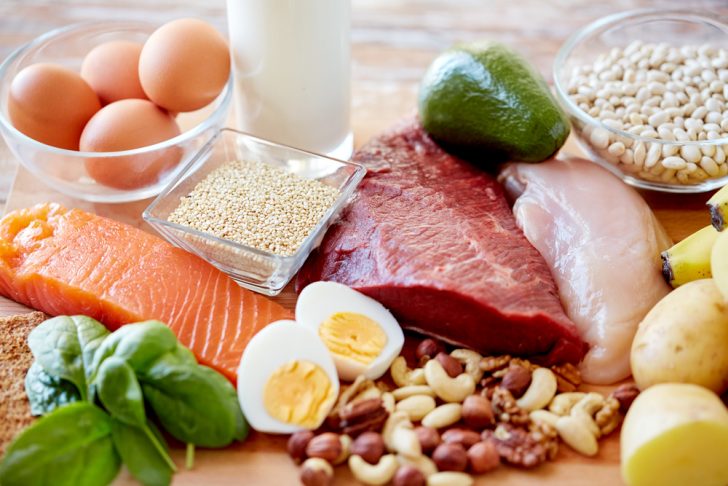
Is Vegan Diet Really Healthy?

For the last couple of years, veganism remains at the height of every dietary debate. The “sustainability trend” is bringing about converts by the hundreds every passing day. While the intentions are pure, however, veganism can cause some long term damages to your health.
As the dietary approach garners popularity, many prominent experts continue voicing their concerns over the eradication of animal-based products in consumption practices.

Deposit Photos | Vegan burgers with beans and vegetables served with spinach
Who Are These Experts?
Back in 2017, Professor of Paediatric Nutrition, Dr. Mary Fewtrell, addressed the European Society for Paediatric Gastroenterology, Hepatology, and Nutrition with concerns over the repercussions a young infant may face if subjected to a purely vegan diet, which includes irreversible cognitive damage.
Two years later, Dr. Emma Derbyshire, a public health nutritionist, warned that a strictly vegan diet could become the cause of a choline crisis. Writing in the BMJ Nutrition, Prevention, and Health Journal, she highlighted the importance of omega-3 fatty acids, choline, and vitamin B-12 in key stages such as fetal development, brain development, and overall health. She warned that the health of the future generation is at terrible risk if such trends continue gaining popularity.

Unsplash
What Are The Risks?
As mentioned, eliminating animal-based products from the diet deprive the body of certain essential nutrients, which are as follows:
1. Essential Fatty Acids
The exclusion of certain acids that your body can’t produce itself, such as omega-3 fatty acids, leaves the brain vulnerable. A study consisting of 48000 individuals who were followed for 18 years found that chances of stroke increase by up to 20% when consuming a plant-based diet. Although a plant-based omega-3 exists, known as the ALA, it is pretty inefficient against the actual nutrient. For a deeper understanding, imagine a house with bricks to make up its walls. Now, replace those bricks with polystyrene. Does the job but, can it promise support through tough times? This is the main difference between omega-3 fatty acids and ALA.
2. Vitamin B-12
Experts reveal that Vitamin B-12 is an essential nutrient for brain health and nerve function. According to research carried out by dietitian Sophie Medlin, B-12 deficiency is a reality among 50% of vegans unless they opt for supplements.
The risk of deficiency is even more severe for infants and children, as it can cause seizures, developmental delay, brain atrophy, intellectual disability, and failure to thrive. Vitamin B-12 is another nutrient that the body cannot produce and is found in animal-based products such as poultry, fish, meat, dairy, eggs, and yeast.
Deficiency of other nutrients, such as amino acids, choline, Vitamin D, calcium, and iodine can also cause brain-related damages in an animal-product deprived body.
3. Iron
Lastly, iron is essential for healthy blood cells. Iron from animal products is much easier for the body to absorb than from plant products; therefore, a vegan body is severely iron-deficient. Young ones with an iron deficiency, especially, face a harder time learning as their blood cells are unable to produce energy.

Deposit Photos | A balanced diet is essential to a healthy body and brain
Bottom Line
People world over are charging headfirst into veganism, with an intention to save the earth but, without realizing the consequences and understanding the implications with such a severe diet change. If you’re a vegan or are thinking of switching diets, be sure to consult an expert on how you can meet daily nutrient requirements without animal products.
More inHealthy Trends
-
`
Why Are Men Taller Than Women? New Genetic Study Finds Clue
For centuries, the average height difference between men and women has been noticeable—men generally stand about five inches taller. While environment...
July 23, 2025 -
`
How Upcycled Beauty Ingredients Are Reshaping the Industry’s Future
The beauty industry is going through a big shift — and it’s not just about trends. As waste problems grow and...
July 17, 2025 -
`
A Look Inside Faith Kipyegon’s Groundbreaking Mile Run in Paris
Last week in Paris, Faith Kipyegon returned to a place she knows well: Stade Sébastien Charléty. But this time, she wasn’t...
July 9, 2025 -
`
Dairy Is Making a Major Comeback — And Health Shoppers Are Loving It
Just a few years ago, dairy sat quietly in the back seat while plant-based alternatives took the spotlight. Now, it’s stepping...
July 4, 2025 -
`
Does Aging Cause Dental Problems?
Aging doesn’t automatically mean losing teeth or developing gum disease. In fact, older adults today are holding onto more of their...
June 25, 2025 -
`
How Upcycled Ingredients Are Shaping the Future of Cosmetics
What used to end up in bins or compost heaps is now finding a new life inside skincare bottles and beauty...
June 18, 2025 -
`
Rock Legend Rod Stewart Trains to Break Sprint Record at 80
Age isn’t slowing Rod Stewart down. Known worldwide for his legendary voice, stadium-filling tours, and timeless hits like “Maggie May”, the...
June 11, 2025 -
`
The Truth Behind Detox Diets – Health Boost or Risky Trend?
It’s hard to scroll through your feed without seeing someone sipping green juice with promises of instant energy, glowing skin, and...
June 3, 2025 -
`
Is Dr. Oz Fit to Lead Medicare?
The announcement of Dr. Mehmet Oz as President-elect Donald Trump’s pick to lead the Centers for Medicare and Medicaid Services (CMS)...
May 29, 2025















You must be logged in to post a comment Login